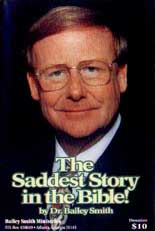 I guess Bailey Smith has long been telling "The Saddest Story in the Bible". After hearing him at the Jax Pastor's Conference, I just had to go back and take a look at that well-known Hall of Faith that is Hebrews 11. I thought to myself, surely a man like Dr. Smith would have the credentials and time-tested expertise to navigate this text without missing the boat entirely. A simple reading of the chapter proves to be more than his sermon could stand.
I guess Bailey Smith has long been telling "The Saddest Story in the Bible". After hearing him at the Jax Pastor's Conference, I just had to go back and take a look at that well-known Hall of Faith that is Hebrews 11. I thought to myself, surely a man like Dr. Smith would have the credentials and time-tested expertise to navigate this text without missing the boat entirely. A simple reading of the chapter proves to be more than his sermon could stand.
I don't understand his motives behind his sermon and I don't pretend to. I have no idea if he understood the text perfectly and simply wanted to present some obscure point of application as his sermon topic, but even with this benefit there simply is no excuse for presenting a text in this way. Thousands of pastors were present and within the hearing and influence of this sermon and for that reason alone Dr. Smith should have been more careful. His influence is real, even if it falls to those who cannot discern. I suppose that is the way it always happens with such teachers.
Dr. Smith's sermon concerned itself with this question: how can we prevent their sacrifice from being in vain? His presupposition was that fallen and persecuted saints labored for Christ, but to no avail if we who follow behind them are not faithful. This is simply nowhere to be found.
Hebrews 11 is not about striving in the hope of future generations. Hebrews 11 is about the faith of the people of God. Faith is defined as "the assurance of things hoped for, the conviction of things not seen." (Heb. 11:1) Faith's effect for OT believers was that through it they "received their commendation." (Heb. 11:2) Why did they receive a commendation through faith? Because they had an assurance of things hoped for, a promise that acted as the north star by which they navigated their lives. The promise they believed and sought and lived to see fulfilled was of a coming Messiah, a future King and a Savior.
Each and every person mentioned in Hebrews 11 was commended by their faith in the word of God. Their salvation was the same as ours. Isn't this the clear theme of the chapter? Faith commends us to God. Faith in what? Faith in the word of God. In the OT economy, their faith was placed in the coming fulfillment of the promise of Messiah. In the NT economy, our faith is placed in the fulfilled promise of the coming Messiah. They placed their faith in the word to come, we in the word fulfilled. The object of faith can only be explained as Jesus Christ. Consider
Beginning in verse 32, the floodgates open as the author begins to think of all that could illustrate this assurance of things hoped for. His pen can scarcely keep up with the pictures of faith that come flashing to his mind and he fears that "time would fail" him to tell all of their stories. Our benefit in reading this passage is a heart that swells with gratefulness at the faith placed in the hearts of the men and women of old. Yet, though they suffered much, they did not receive the promise, or better, the fulfillment of the promise. Though they faithfully perservered, they were not granted to see their hope, in life, consummated. Though they were saved from the ravages of sin by their faith, they did not see the One that would save them. No, they "endured, as seeing Him who is unseen." (Heb. 11:27)
It should be clear then from the context of this chapter, let alone the whole of Hebrews, that the object of faith is Jesus and that this is an illustration that all of the people of God, whether old or new, find as the object of their faith Jesus Christ. Therefore, when we come to verses 39 and 40 we can read this simple statement with full assurance of meaning. "God has provided something better (the new covenant) for us (NT believers), so that apart from us (NT faith) they (OT faith) would not be made perfect." Their faith was part of the whole, not the whole in itself. It lacked in that Jesus Christ had yet to be revealed in their time. This made their faith no less saving, just less revealed.
The claim that OT believers work could be rendered in vain is a sub-Christian statement. It denies the very work of redemption and the very claims of Jesus himself. "I will build my church" (
I'm sure that Dr. Smith would say he disagrees with my analysis, but this is indeed what was communicated. If that is not what he meant, he should at the least clarify if not apologize. There are a myriad other texts that can be used to prick the hearts of God's men to faithfulness if that was his aim. Yet I think this uncovers it nicely: when we seek to use the word, we cease being used by the word.
The height of insult was that he used the very object of faith in chapter 11 as an embodiment of the helpless plea of the past. In Dr. Smith's closing illustration, he pictures Jesus holding out his nail-scarred hands and asking us if we have the heart to waste His sacrifice. If this is truly what Dr. Smith believes is possible, then our ability to discern truth is farther gone than I thought. When we cannot tell the voice of the Shepherd from the voice of another, it is disastrous for the flock. And that is truly one of the saddest stories in the bible.

No comments:
Post a Comment